In the evolving landscape of mental healthcare, integrative psychiatry stands out as a holistic mental health patient-centered approach that recognizes the unique nature of each individual’s mental and emotional well-being. This holistic mental health approach seeks to address the complex interplay of factors that contribute to mental health challenges, acknowledging that a one-size-fits-all approach may not be effective.
Key aspects of how integrative psychiatry tailors mental healthcare to individual needs include:
1. Holistic Mental Health Patient-Centered Assessment
– An integrative psychiatrist conduct thorough assessments that consider physical health, emotional state, social connections, lifestyle factors, and spiritual beliefs.
– Recognizing that mental health is influenced by multiple dimensions, integrative psychiatry aims to uncover underlying factors contributing to mental health concerns.
2. Personalized Treatment Plans
– Tailored interventions are designed based on the individual’s assessment, ensuring that the holistic patient centered treatment aligns with their unique needs and preferences.
– Integrative psychiatrists collaborate with other healthcare providers, creating a multidisciplinary team that works together to address all aspects of the individual’s well-being.
3. Wholeness and Balance
– Integrative psychiatry emphasizes the importance of a holistic patient-centered approach to achieving balance and wholeness in an individual’s life, considering the integration of mind, body, and spirit.
– By addressing imbalances and promoting holistic well-being, integrative psychiatry fosters a sense of overall harmony.
4. Mind-Body Connection
– Integrative psychiatry recognizes the bidirectional relationship between mental and physical health, utilizing techniques that promote both psychological and physiological well-being.
– Mindfulness practices, relaxation techniques, and somatic practices are integrated to help individuals manage stress and improve mental resilience.
5. Complementary and Alternative Therapies
– Integrative psychiatry incorporates a wide range of therapeutic modalities beyond traditional approaches, such as acupuncture, yoga, meditation, herbal remedies, and expressive arts therapy.
– These therapies offer diverse ways for individuals to engage with their healing process and find strategies that resonate with their unique preferences.
6. Meaning-Making and Empowerment
– Integrative psychiatry encourages individuals to explore their sense of purpose, values, and beliefs, fostering a deeper understanding of their own identity and life’s meaning.
– By engaging in this process of meaning-making, individuals can experience a sense of empowerment and improved self-esteem.
7. Cultural Sensitivity
– Integrative psychiatry acknowledges the influence of cultural background on mental health perceptions and treatment preferences.
– Cultural competence is integrated into the treatment approach to ensure that interventions are respectful and aligned with the individual’s cultural context.
8. Prevention and Wellness Focus
– Beyond symptom management, integrative psychiatry aims to prevent future mental health challenges by equipping individuals with skills and tools for long-term well-being.
– Lifestyle modifications, stress reduction techniques, optimal nutrition through diet and supplements, and self-care practices are emphasized to enhance resilience and mental fitness.
9. Collaborative Decision-Making
– Integrative psychiatrists engage patients as active partners in their treatment plans, involving them in decision-making and goal-setting.
– This collaborative approach enhances treatment adherence and empowers individuals to take ownership of their mental health journey.
10. Flexibility and Adaptation
– Recognizing that individuals’ needs change over time, integrative psychiatry remains flexible in its approach, adjusting treatment plans as necessary.
– As life circumstances evolve, integrative psychiatry ensures that interventions remain relevant and effective.
11. Holistic Well-Being
– Integrative psychiatry fosters improvements not only in mental health but also in overall well-being, encompassing emotional, physical, social, and spiritual dimensions.
– This comprehensive approach contributes to a more fulfilled and balanced life.
12. Long-Term Results
– Integrative psychiatry focuses on sustainable outcomes, seeking to create lasting positive changes in an individual’s mental health and quality of life.
– By addressing underlying causes and promoting holistic wellness, integrative psychiatry aims to reduce the risk of relapse and enhance resilience.
Integrative psychiatry’s tailored approach to mental healthcare reflects a profound understanding of the complexity of human experience. By embracing the uniqueness of each individual and addressing their multifaceted needs, integrative psychiatry paves the way for a mental health recovery model with transformative healing and lasting well-being.








